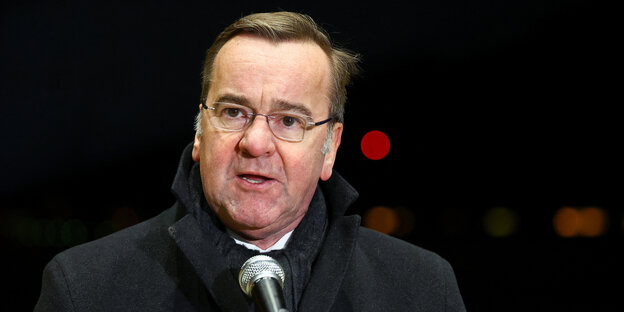The Minister of Defense highlights Germany's commitment. He has clear words about the President of the Serbian Republic.

Defense Minister Boris Pistorius continues to trust Eufor troops Photo: Lisi Niesner/Reuters
SARAJEVO taz | Everything was already settled at the army home of Dom Armija in Sarajevo when German Defense Minister Boris Pistorius showed up there on Tuesday to meet with his counterpart Zukan Helez. In addition to the entourage of the German press, the most important media in Bosnia and Herzegovina also attended. Clarifying words on Germany's position in the global political situation in the Balkans were eagerly awaited.
Hopes for Germany are high in Sarajevo, the capital of Bosnia-Herzegovina, and at least they were not completely disappointed. Defense Minister Pistorius stressed that he wanted to continue Germany's commitment in Bosnia and Herzegovina. The goal is to prevent Russia from misusing “another hotspot, another potentially destabilizing area, to expand its influence, under the assumption or hope” that it can destabilize the West in this way, Pistorius said.
The SPD politician clearly rejected the secessionist rhetoric of Milorad Dodik, president of the Serbian state (Republika Srpska) of the federal state of Bosnia-Herzegovina: “You can't dance at two weddings,” he said. Pistorius was alluding to Bosnian Serb Dodik's threats to separate the Serbian entity from the entire State of Bosnia and Herzegovina.
Meanwhile, Dodik has been on trial in Sarajevo since Monday for his resistance to High Representative Christian Schmidt. The office of the High Representative, with its broad powers – including repealing laws and removing elected representatives – has existed since the end of the Bosnian war in 1995. Dodik ignored its decisions. This is a “purely political process,” says Dodik. The 64-year-old, considered close to the Kremlin, faces up to five years in prison.
Can the Eufor under Hungarian command be trusted?
The entire Western Balkans are of great importance for security and stability in Europe, Pristorius stated. His counterpart Helez said Bosnia and Herzegovina would never accept a secession like Dodik would like, but warned of further destabilization of the country.
However, the previous security structure – putting the country's security in the hands of the military mission Eufor (European Union Force) – is controversial in Bosnia and other countries. Hungary took over command of Eufor in the summer. According to critics, Hungarian Prime Minister Viktor Orbán's pro-Russian stance has turned the goat into a gardener. Bosnian analysts fear that Hungarian troops could switch sides in the event of a conflict.
But the militaries of both countries do not want to believe that. When asked by Taz, neither Helez nor Pristorius wanted to give a clear statement about the demand to station NATO troops in Bosnia. For Helez this is certainly conceivable, but Pistorius indicated: NATO should only have to guarantee the country's stability as a last resort.
Collaboration: Lisa Schneider
Note: The text said that the United Nations appoints the High Representative. That is not correct, he is appointed by the Peace Implementation Council. We remove the ticket.